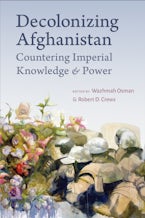As the first comprehensive volume to explore the impact of empire on Afghanistan’s past and present, Decolonizing Afghanistan marks a decolonial turn in Afghanistan and American studies. Featuring new and often sidelined ground-up perspectives this collection examines how Afghan communities have subverted, resisted, and participated in colonial projects from the early twentieth century to the present, with a particular focus on the US intervention that began in 2001. Contributors interrogate the relationship between knowledge and power to analyze how narratives about Afghanistan have framed and legitimated imperial governance. Topics span the contradictions and consequences of the US “forever” War, the rise of private security contracting, the deployment of biometric and surveillance technologies, the politics of US and Taliban counter-media operations, the evolution of gender discourses, and the mobilization of Afghan-Americans and “Afghan Culture,” among others. Throughout, contributors draw important connections and insights to ongoing global anticolonial struggles and offer new decolonial futures.
Contributors. Matthieu Aikins, Dawood Azami, Purnima Bose, Paula Chakravartty, Robert D. Crews, Marya Hannun, Ali Karimi, Nivi Manchanda, Sabauon Nasseri, Tausif Noor, Wazhmah Osman, Hosai Qasmi, Zohra Saed, Gazelle Samizay, Morwari Zafar, Helena Zeweri
Introduction. Decolonizing Afghanistan: A Turning Point / Wazhmah Osman, Helena Zeweri, and Robert D. Crews 1
Section 1. Imperial Imaginaries and the Historical Production of Afghanistan as a Diagnostic Object of Global Security
1. Imperial Misconceptions: The Politics of Knowledge Production / Nivi Manchanda 35
2. Afghanistan and the Soviet Colonial Archive / Robert D. Crews 54
3. The Imperial Gaze and the Development Gaze: Reckoning with the Two Faces of American Empire and Its Afterlives and Deaths / Wazhmah Osman 72
Section 2. Infrastructures and Technologies of Empire
4. Operationalizing "Afghan Culture": Role-Playing and Translation in US Military Counterinsurgency Training / Morwari Zafar 97
5. Shifting Loyalties and Profits: The Rise of Afghanistan's Western-Funded Private Security Contractors / Matthieu Aikins 115
6. Tracking and Targeting: The US Surveillance Infrastructures in Afghanistan / Ali Karimi 134
Section 3. The Politics and Optics of Representation: Media and Propaganda
7. Modernity and Gender Beyond the European Gaze: International Media Coverage of Afghanistan and the Making of News in the 1920s—King Amanullah and Queen Suraya's Grand Tour / Marya Hannun 153
8. A Changing Orientalist Representation of Afghans and Afghanistan in Indian Cinema / Hosai Qasmi 174
9. Withdrawal Narratives: Afghan Women, Time, and Developmental Idealism / Purnima Bose 194
10. The Second Front: The Taliban Information Operation and the Battle for Hearts and Minds in the US/NATO War in Afghanistan (2001–2021) / Dawood Azami 218
Section 4. Reflecting and Speaking Back to Empire
11. Between Humanitarian Aid and Political Critique: Afghan American Mobilizations Post-Evacuation / Helena Zeweri 247
12. Reflections: Afghan Literature and Politics Under US Occupation / Sabauon Nasseri 267
13. Imperial Remainders: Reconfiguring the Legacy of US Occupation in Contemporary Afghan Art / Tausif Noor 284
14. Disrupting the Colonial Canvas: Afghan Art in the Wake of Withdrawal / Gazelle Simizay 295
15. An Other Afghanistan: Indigeneity, Migration, and Belonging in Andkhoy (1973) / Zohra Saed 317
Coda / Paula Chakravartty 335
Acknowledgments 343
Contributors 345
Index 351

